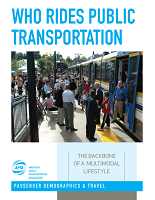The Missouri Public Transit Association (MPTA) through a partnership with the American Public Transportation Association (APTA) hosted a special webinar for members to examine APTA’s latest report, “Who Ride Public Transportation.” Darnell Grisby, APTA’s Director of Policy Development and Research outlined some of the current transit ridership trends.
Grisby highlighted the fact that public transit riders are part of the engine that powers America’s economy, with 87% of public transit trips directly impacting the economy through connecting people to employers needing workers and to retail and entertainment venues. Seventy-one percent of public transportation riders across the country are employed, and another 7% are students. This study, authored by the CJI Research Corporation, is the most extensive demographic report of public transit riders ever, with nearly 700,000 passenger surveys.
Many transit providers nationally are facing a decline in ridership. “Knowing your market is key to promoting transit services especially in light of the declining ridership trends in many markets,” said Kimberly Cella, MPTA Executive Director. “Darnell outlined several actions Missouri transit providers can do right away to help stem this trend from occurring.”
Grisby indicated that research is demonstrating cheap gasoline an subprime loans for vehicles are lending to reduction in transit ridership. Ways to combat these trends include:
- Changing transit service in a given community from coverage to mainline service with higher frequencies. This increases competitiveness of transit with other choices like Uber.
- Ensuring service is connected to smartphones. Riders want real time, accurate information as quickly as possible through smartphones. Making transit competitive with other transportation choices means making transit service info available via the phone. In addition, there is also an increase in the number of smartphones users across all populations including lower income populations with the “pay as you go” phones.
- Build partnerships with alternative transportation providers to improve responsiveness.
More information is available on APTA’s resources at www.apta.com/resources.
